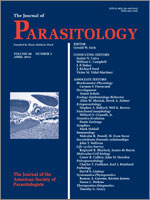The seroprevalence of Toxoplasma gondii infection in sheep (Ovis aries) in northern Mexico is largely unknown. Antibodies to T. gondii were determined in serum samples from 511 sheep from 8 farms in Durango State, Mexico, using the modified agglutination test (MAT). Sheep were raised in 3 geographical regions, i.e., mountainous (n = 68), semi-desert (n = 132), and valley (n = 311). Overall, T. gondii antibodies were found in 77 (15.1%) of 511 sheep, with MAT titers of 1∶25 in 27, 1∶50 in 10, 1∶100 in 11, 1∶200 in 11, 1∶400 in 8, 1∶800 in 3, 1∶1,600 in 4, and 1∶3,200 in 3. The seroprevalence of T. gondii infection increased significantly with age, indicating post-natal transmission. In contrast, gender, breed, flock size, and geographic region did not significantly influence the seroprevalence. Seropositive sheep were found in 7 of 8 farms sampled. This is the first report of T. gondii infection in sheep in Durango State, Mexico. Results indicate that infected sheep are probably an important source of T. gondii infection for humans in Durango State.
BioOne.org will be down briefly for maintenance on 12 February 2025 between 18:00-21:00 Pacific Time US. We apologize for any inconvenience.
How to translate text using browser tools
1 April 2012
Seroprevalence of Toxoplasma gondii Infection in Domestic Sheep in Durango State, Mexico
C. Alvarado-Esquivel,
C. García-Machado,
D. Alvarado-Esquivel,
J. Vitela-Corrales,
I. Villena,
J. P. Dubey
ACCESS THE FULL ARTICLE

Journal of Parasitology
Vol. 98 • No. 2
April 2012
Vol. 98 • No. 2
April 2012




